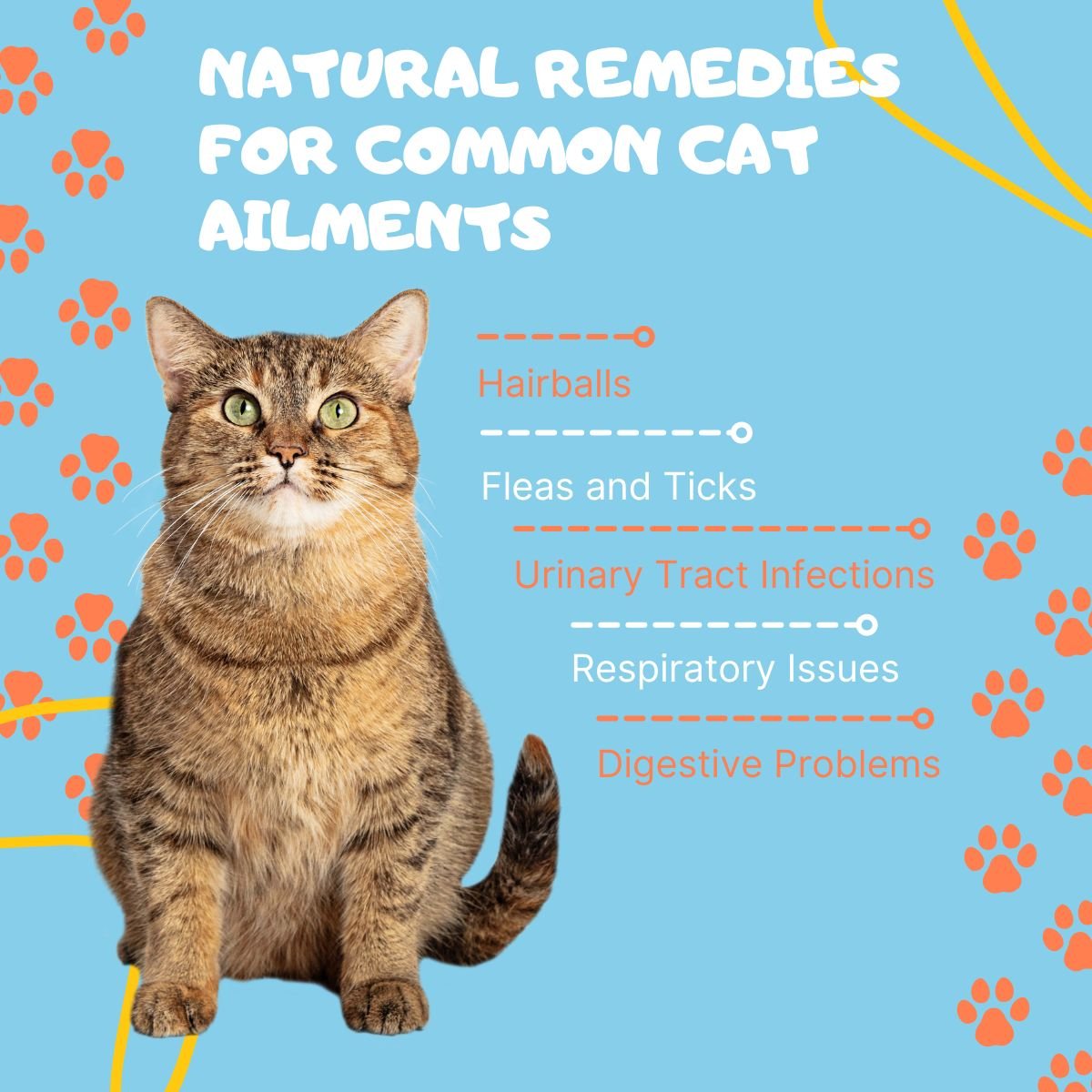Natural Remedies for Common Cat Ailments
Have you ever wondered how to treat common ailments in your beloved feline companions naturally? As a cat owner, you might face minor health issues affecting your pet’s well-being. While it’s crucial to consult a veterinarian for serious conditions, there are some natural remedies that you can use for common cat ailments. These remedies can offer relief and support in a gentle, non-invasive manner.
Identifying Common Cat Ailments
Before exploring potential remedies, it’s important to recognize the most common ailments that can occur in cats. Understanding these ailments will help you identify when and how a natural remedy might be appropriate.
Hairballs
Hairballs are perhaps one of the most frequent issues that cats face. While it’s normal for cats to groom themselves, the ingestion of fur can lead to uncomfortable hairballs. When a cat is unable to expel this fur naturally, it can form into a hairball, causing discomfort and sometimes even digestive issues.
Fleas and Ticks
Fleas and ticks are parasites that can lead to skin irritation and discomfort. Not only are these pests annoying, they can also transmit diseases to your furry friend, making it essential to manage them promptly.
Urinary Tract Infections
Urinary tract infections (UTIs) can be a painful experience for cats, often causing frequent urination, discomfort, and sometimes more severe health issues if left untreated.
Respiratory Issues
Similar to humans, cats can suffer from respiratory issues such as colds, which can manifest through sneezing, coughing, and nasal discharge. These symptoms can make your cat feel miserable and lethargic.
Digestive Problems
Upset tummies, diarrhea, and constipation are among the digestive problems that cats can encounter. These issues can stem from diet, stress, or even an underlying health condition.
Natural Remedies for Hairballs
Taking care of your cat involves ensuring they are comfortable and healthy. Hairballs can be managed and minimized using natural methods that support your cat’s digestive health.
Pumpkin
Pumpkin is a natural source of fiber, and adding a small amount to your cat’s diet can help in the elimination of hairballs. The fiber content aids in moving ingested hair through the digestive tract more efficiently.
Coconut Oil
Coconut oil can act as a natural lubricant, helping hairballs pass through the system. You can add a teaspoon to your cat’s food once a day, which can also benefit their coat and skin health due to its moisturizing properties.
Regular Grooming
Regularly brushing your cat’s coat can significantly reduce the amount of fur they ingest. By removing loose hair before it can be swallowed, you decrease the likelihood of hairball formation.
Remedies for Fleas and Ticks
Keeping your cat free from fleas and ticks not only enhances their comfort but also prevents more serious health issues.
Apple Cider Vinegar Spray
Apple cider vinegar can be used as a natural flea repellent. A diluted spray, made by mixing equal parts of apple cider vinegar and water, can be applied to your cat’s fur. This mixture drives away fleas and leaves your cat’s coat smooth and shiny.
Diatomaceous Earth
Food-grade diatomaceous earth is a fine powder that, when sprinkled on your cat’s coat, can effectively kill fleas. The powder dehydrates the fleas, causing them to die and fall off, without harming your pet.
Herbal Flea Collars
Using a flea collar infused with essential oils like cedarwood or lavender can help to repel these troublesome parasites naturally. Ensure that these collars are specifically designed for cats to avoid irritation.
Addressing Urinary Tract Infections
UTIs can be uncomfortable for cats, but some natural remedies can help alleviate symptoms and prevent recurrence.
Cranberry Supplements
Cranberry is known for its benefits in promoting urinary tract health. A cranberry supplement designed for pets can be beneficial in preventing bacteria from sticking to the urinary tract walls, thus reducing infections.
Hydration
Ensuring your cat is well-hydrated is crucial in managing UTIs. Fresh, clean water should be readily available to encourage frequent drinking, which helps flush out the urinary system.
Wet Food Diets
Switching to a wet food diet can provide additional hydration and reduce the risk of urinary tract issues. The added moisture in wet food helps maintain healthy urinary tract function.
Natural Remedies for Respiratory Issues
Comforting a cat with respiratory troubles involves finding ways to relieve congestion and soothe irritated airways.
Steam Therapy
Just as humans benefit from steam inhalation, cats can also find relief from breathing difficulties with steam therapy. Running a hot shower and letting your cat sit in the steam-filled bathroom will help open their nasal passages.
Humidifiers
Adding a humidifier to the room where your cat spends most of their time can maintain humidity levels, preventing their nasal passages from drying out and reducing coughing spells.
Herbal Teas
If your cat will tolerate it, a few drops of non-caffeinated herbal teas such as chamomile or echinacea can be added to their water to boost their immune system and relieve respiratory symptoms.
Solutions for Digestive Problems
Digestive troubles are distressing for both you and your cat. There are, however, ways to naturally address these issues and improve their digestive health.
Probiotics
Probiotics can restore healthy gut flora and are effective in treating a wide range of digestive disorders. Adding a probiotic specifically formulated for cats to their diet can promote a steady gut environment.
Slippery Elm Bark
Slippery elm bark is a natural remedy with soothing properties that can help alleviate diarrhea and constipation. It calms the digestive tract and supports normal bowel function.
Ginger
For cats experiencing nausea, a small dose of ginger, which contains natural anti-inflammatory properties, can be mixed into their food. It’s essential to ensure the ginger is finely grated to prevent choking.
Holistic Practices for Overall Well-being
While natural remedies can target specific ailments, incorporating holistic practices can contribute to your cat’s overall health and well-being.
Diet Management
A balanced diet tailored to your cat’s specific needs is the backbone of their health. Providing high-quality, nutrient-rich food supports their immune system and helps ward off common ailments.
Stress Reduction
Cats are creatures of habit and can become stressed with changes in their environment. Creating a calm and stable environment by providing routine and safe spaces alleviates stress, which can reduce the likelihood of health issues.
Regular Vet Check-ups
While natural remedies are beneficial, regular veterinary check-ups are vital to preemptively address health concerns. A veterinarian can provide guidance and detect potential issues before they become more serious.
Implementing Natural Remedies Safely
Your cat’s health is paramount, and implementing natural remedies requires careful consideration to ensure safety and efficacy.
Consulting a Veterinarian
Before introducing any natural remedy, consulting with a veterinarian is advisable, especially if your cat has underlying health conditions. Veterinarians can provide personalized advice based on your pet’s individual health needs.
Monitoring and Adjusting
Observing your cat’s response to a new remedy is crucial. If adverse reactions occur, it is essential to discontinue use and seek veterinary guidance. Being attentive and flexible allows you to fine-tune their care routine effectively.
Avoiding Human Remedies
Not all natural remedies safe for humans are suitable for cats. Some substances can be toxic to pets, so it’s vital to use only those remedies specifically deemed safe for feline use.
Conclusion
Exploring natural remedies for common cat ailments empowers you to support your feline friend in a gentle and effective manner. By incorporating these holistic practices, you can enhance your cat’s quality of life, promoting their health and longevity. Remember, while these remedies are beneficial, they should complement, not replace, professional veterinary care when necessary. Through a balanced approach, you and your cat can enjoy a happy and healthy life together.






